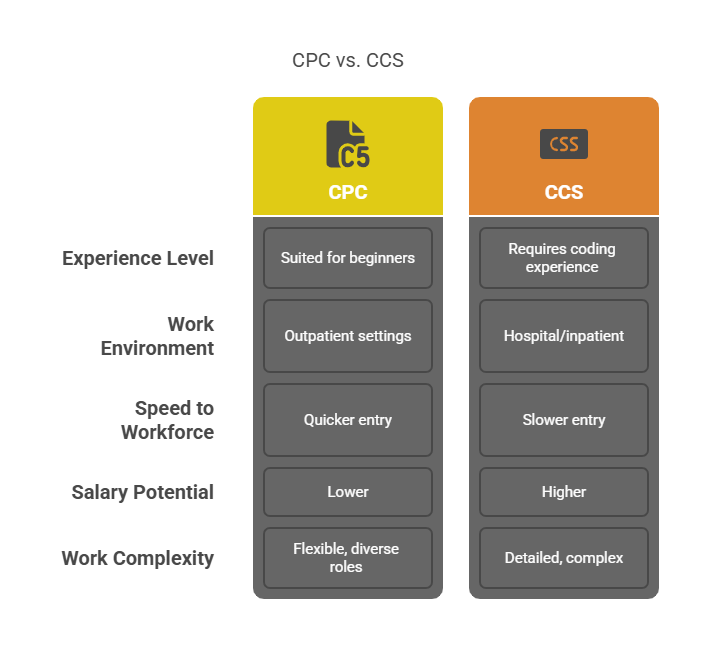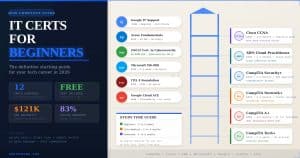CPC Vs CCS salary is the talk of the medical town these days! The healthcare industry continues to expand rapidly, creating a growing demand for skilled healthcare professionals, particularly medical coding professionals. As healthcare providers become more reliant on accurate coding for billing and compliance, the need for certified coders is at an all-time high. Among the top certifications in this field are the Certified Professional Coder (CPC) and the Certified Coding Specialist (CCS).
If you’re considering a career in medical billing and coding, understanding the differences, benefits, and opportunities associated with these two certifications is essential.
This guide will help you choose between CPC and CCS certifications with clarity and confidence.
What is the CPC Certification?
The Certified Professional Coder (CPC) credential, offered by the American Academy of Professional Coders (AAPC), is one of the most recognized and respected medical coding certifications in outpatient medical coding, especially among CPC and CCS credentials.
What Does a CPC Do?
CPC-certified professionals specialize in translating medical records and medical procedures into standardized codes. They work primarily in outpatient settings such as physicians offices, clinics, and ambulatory surgery centers. Their responsibilities include reviewing medical documentation, applying appropriate CPT (Current Procedural Terminology), ICD-10-CM, and HCPCS Level II codes, and ensuring accurate billing and regulatory compliance.
CPC professionals play a crucial role in the reimbursement process by supporting proper claims submission and minimizing denials. They are also responsible for ensuring that medical services are coded accurately to reflect the care provided.
CPC Certification Exam Breakdown
The CPC exam is designed to test your knowledge of medical terminology, anatomy, coding guidelines, and healthcare regulations. The format is multiple-choice, with real-world scenarios to assess your coding proficiency.
CPC Exam Details:
- Format: 100 multiple-choice questions
- Duration: 4 hours
- Passing Score: 70%
- CPC Exam Cost: Varies (around $300–$400, discounts for AAPC members)
Eligibility and Preparation
While there are no formal prerequisites to take the CPC exam, AAPC recommends that candidates complete medical coding training programs or have at least two years of on-the-job coding experience. Entry-level medical coders can also prepare using coding courses, practice exams, and AAPC-approved materials.
If a candidate passes the CPC exam without relevant medical coding experience, they receive an apprentice designation (CPC-A) until they meet the experience requirement.
CPC Certification Salary Outlook
One of the most appealing aspects of the CPC coding credential is its earning potential. On average, a certified professional coder CPC earns around $48,500 annually in the U.S. through medical billing However, this varies based on geographic location, experience, and workplace setting.
Sample Salaries by Location:
- Washington: $57,721
- New York: $53,964
- Texas: $47,600
- California: $52,988
CPC professionals typically find employment in physician practices, insurance companies, and outpatient care facilities. Their expertise in outpatient coding makes them valuable assets in a variety of healthcare settings.
What is the CCS Certification?
The Certified Coding Specialist (CCS) medical coding certification is offered by the American Health Information Management Association (AHIMA). Unlike CPC, which focuses more on outpatient coding, CCS certification is geared toward hospital and inpatient coding.
What Do CCS Professionals Do?
Certified coding specialists CCS professionals are trained to analyze complex medical records, perform diagnostic coding and procedural coding, and ensure accurate documentation for hospital stays. CCS-certified coders often handle cases involving surgeries, critical care, and specialized treatments, making them crucial for reimbursement-related coding and regulatory compliance.
CCS professionals typically work in hospitals, acute care settings, and larger healthcare systems. Their ability to navigate complex medical records and inpatient coding requirements makes them in high demand.
CCS Exam Structure
The CCS exam is known for its rigor and complexity. Unlike the CPC exam, the CCS exam consists of both multiple-choice and real-world medical scenarios.
CCS Exam Format:
- Sections: Multiple-choice + Medical Scenario Section
- Questions: ~115–140 total
- Duration: 4 hours
- Passing Score: 300 (scaled)
CCS Exam Requirements
To sit for the CCS certification exams, AHIMA recommends:
- Coding experience or formal coding education
- Completion of courses in anatomy, medical terminology, pathophysiology, pharmacology, coding systems (ICD and CPT), and healthcare reimbursement methods
- One or more years of medical coding experience
Alternative eligibility options include holding other AHIMA credentials (e.g., RHIA, RHIT, CCS-P) or certifications from other organizations.
CCS Certification Salary Outlook
According to the latest data, CCS-certified inpatient coder professionals tend to earn higher salaries than CPC-certified coders, thanks to their expertise in diagnostic coding, inpatient coding, and hospital documentation.
CCS Salary Averages by State:
- Wyoming: $66,829
- Wisconsin: $65,962
- New Jersey: $67,311
- Oregon: $64,945
National Median: Around $64,000
This higher salary reflects the specialized nature of CCS work compared to cpc and ccs and the complexity of inpatient coding environments.

CPC vs CCS: Which Exam is Harder?
Both the CPC (Certified Professional Coder) and CCS (Certified Coding Specialist) exams are designed to evaluate a candidate’s medical coding knowledge, but they differ significantly in focus, structure, and level of difficulty, especially between CPC and CCS credentials.
CPC Exam Difficulty
The CPC certification exam, offered by AAPC, is known for its focus on outpatient coding. It tests your ability to assign the correct CPT (Current Procedural Terminology), ICD-10-CM, and HCPCS Level II codes based on real-world medical scenarios. This exam places a strong emphasis on medical terminology, coding guidelines, anatomy, and understanding regulatory compliance related to outpatient services.
While the exam is comprehensive, it is generally considered more accessible for individuals who have completed medical coding training or have gained entry-level coding experience in outpatient settings. Many new medical coding professionals choose the CPC exam as their starting point because it does not require formal coding experience for eligibility. Candidates without hands-on experience will still need to complete extensive practice exams and study materials to grasp coding documentation and reimbursement-related coding principles.
Key Challenges of the CPC Exam:
- Time pressure (100 questions in 4 hours)
- Understanding evaluation and management (E/M) coding
- Navigating through multiple coding manuals during the test
- Interpreting documentation for accurate outpatient coding
However, with consistent preparation, focused coding courses, and practical mock tests, even beginners can succeed in the CPC exam online or in person.
CCS Exam Difficulty
The CCS certification exam, offered by AHIMA, is often considered more complex and is tailored for coders with intermediate to advanced coding experience, especially in inpatient settings. The CCS exam consists of two sections:
- A multiple-choice section covering topics like diagnostic coding, procedural coding, and coding guidelines
- A medical scenario section that simulates real-world hospital coding challenges
This exam requires strong proficiency in ICD-10-CM, ICD-10-PCS, and CPT/HCPCS systems. CCS-certified coders must also understand medical records, hospital discharge summaries, surgical reports, and the intricacies of inpatient coding—all of which demand a deeper level of clinical and coding knowledge.
Many CCS-certified professionals have at least 1–2 years of coding experience before attempting the exam. Some candidates hold prior credentials such as Certified Coding Associate (CCA), Certified Professional Coder CPC, or even degrees in health information management.
Key Challenges of the CCS Exam:
- Interpreting complex medical records and hospital scenarios
- Applying the correct diagnosis and procedure codes in inpatient settings
- Understanding coding for critical care and surgical services
- Meeting AHIMA’s more stringent exam format and passing criteria
The CCS certification exams are best suited for those aiming to work in hospital coding, acute care, and health systems where coding precision directly impacts medical billing and insurance reimbursement.
Key Differences at a Glance
| Factor | CPC Exam | CCS Exam |
|---|---|---|
| Focus | Outpatient services | Inpatient services |
| Coding Systems | CPT, ICD-10-CM, HCPCS | ICD-10-CM, ICD-10-PCS, CPT |
| Experience Needed | None required (recommended) | 1–2 years coding experience recommended |
| Exam Format | 100 MCQs | MCQs + medical scenario section |
| Primary Difficulty | Time management, outpatient case scenarios | In-depth coding knowledge, complex medical records |
| Target Audience | Beginners and outpatient coders | Experienced medical coders in hospital settings |
Which One Should You Choose Based on Difficulty?
- If you’re a newcomer to medical coding, or you’re aiming to work in outpatient clinics or physician offices, the CPC certification exam offers a manageable entry point with solid career prospects.
- If you already have substantial medical coding experience, especially with hospital documentation, the CCS certification may be a more suitable path. It will open doors to higher-level roles and ccs vs cpc salary advantages.
Regardless of the path you choose, success in either exam requires focused preparation, deep coding knowledge, and a solid understanding of medical terminology. Leverage coding courses, professional development resources, and practice exams tailored to the exam format you’re pursuing. Both certifications are highly respected in the healthcare industry, and mastering either sets you apart as a skilled medical coder in a competitive job market.
Long-Term Costs: CPC vs CCS
When deciding between CPC and CCS certifications, it’s important to look beyond just the exam fee. The long-term financial investment includes membership dues, study materials, recertification costs, continuing education, and optional training, each of which can influence your overall decision. You can also compare CPC and CCS with khttps://certempire.com/nclex-practice-questions/
.
Let’s break down and compare the true cost of earning and maintaining each medical coding certification over time.
CPC Certification Costs (Certified Professional Coder)
The CPC certification, administered by AAPC, comes with both upfront and ongoing costs. While the CPC exam itself is moderately priced, maintaining the CPC credential involves membership and continuing education requirements that can add up over the years.
Estimated Breakdown:
- CPC Exam Fee: ~$399 (with discounts for AAPC members)
- AAPC Annual Membership: ~$205/year (required to keep your credential active)
- Study Materials: $300–$600 for coding books, CPC certification exam prep guides, and practice exams
- Medical Coding Training (Optional): Up to $3,000 if you opt for AAPC’s official courses or a medical coding training program from a third-party provider
- CEUs (Continuing Education Units): 36 CEUs required every two years, which may cost an additional $100–$300 depending on the source
Other Potential Costs:
- Exam Retake Fee: Applicable if you don’t pass on the first attempt
- Specialty Certifications (Optional): CPC holders may also choose to pursue certifications like Certified Risk Adjustment Coder (CRC) or Certified Outpatient Coder (COC) for career advancement, which adds further cost.
CCS Certification Costs (Certified Coding Specialist)
The CCS certification, managed by AHIMA, may initially appear less costly, primarily because AHIMA membership is not mandatory. However, there are still several important expenses to consider for CCS-certified professionals, especially those who want access to AHIMA resources, career tools, and proper coding documentation.
Estimated Breakdown:
- CCS Exam Fee: ~$399 (price varies slightly for AHIMA members vs. non-members)
- AHIMA Membership (Optional): ~$135/year – while not required, many CCS professionals opt for it to access exclusive content, webinars, and reduced recertification costs
- Study Materials & Prep: $200–$500, including CCS exam prep books, coding manuals, and sample tests
- Coding Courses (Optional): Some candidates enroll in professional development courses to strengthen coding knowledge, especially in inpatient coding, which can range from $1,000 to $2,500
- Recertification Fee: Paid every two years (currently around $218, depending on AHIMA’s guidelines)
- CEUs: 20 CEUs required every two years (costing ~$100–$200)
Additional Considerations:
- CCS certification exams are more intense, so many candidates invest extra in exam prep or even live bootcamps to increase their chances of passing on the first attempt.
CPC vs CCS: Which Offers More Value for Money?
| Cost Category | CPC Certification | CCS Certification |
|---|---|---|
| Exam Fee | ~$399 | ~$399 |
| Membership | Required ($205/year) | Optional (~$135/year) |
| Study Materials | $300–$600 | $200–$500 |
| Coding Training | Optional, up to $3,000 | Optional, up to $2,500 |
| Recertification Fee | Included in membership | ~$218 every 2 years |
| CEUs | 36 every 2 years | 20 every 2 years |
| Total 2-Year Cost (est.) | $1,200–$4,000+ | $800–$3,500+ |
While CPC and CCS certifications both come with a price tag, they’re long-term investments in your medical coding career. CPC is ideal for those entering the field or focusing on outpatient services, while CCS caters to experienced medical coders and medical billers working with complex medical records in hospitals and acute care settings.
CPC and CCS Certifications: Career Path Comparison
Choosing between CPC and CCS largely depends on your desired career setting, coding expertise, and salary goals. Here’s how they compare:
| Feature | CPC Certification | CCS Certification |
|---|---|---|
| Focus | Outpatient Coding | Inpatient Coding |
| Common Workplaces | Clinics, Physician Offices, Ambulatory Centers | Hospitals, Acute Care, Health Systems |
| Starting Point | Entry Level Medical Coders | Requires Prior Coding Experience |
| Salary Range | $40,000–$57,000 | $45,000–$67,000+ |
| CEUs Required | 36 every 2 years | 20 every 2 years |
| Certification Body | AAPC | AHIMA |
| Exam Format | MCQs | MCQs + Medical Scenario Section |
Market Demand & Industry Trends
The demand for certified coders continues to grow, driven by increased healthcare services, regulatory oversight, and technological adoption in the healthcare industry.
Demand for CPC Professionals
CPC professionals are especially in demand in outpatient settings such as ambulatory surgery centers and private clinics. Their role is critical in managing medical billing, ensuring accurate documentation, and minimizing claim rejections.
Demand for CCS Professionals
CCS-certified professionals are highly sought after in hospital systems, due to their expertise in coding complex medical records and supporting hospital reimbursement strategies. The rising volume of inpatient admissions and emphasis on regulatory compliance continue to boost the need for CCS professionals.
The Role of Coding Experience
While CPC certification allows beginners to enter the field, CCS generally requires more substantial coding experience. Both certifications reward experienced medical coders with better roles, leadership opportunities, and higher salaries.
If you’re starting fresh, CPC is a better stepping stone. If you already have years of experience, especially with inpatient records, CCS may elevate your career further.
CPC vs CCS Salary: Who Comes Out on Top?
When comparing CPC vs CCS salary, the advantage generally leans toward CCS-certified coders due to their specialized skills and coding expertise in hospital coding roles.
However, salary should not be your only consideration. Career goals, preferred healthcare settings, and work-life balance are also key factors.
Final Verdict: CPC or CCS?
So, which certification runs the show, CPC or CCS? The answer depends on where you see yourself in the medical coding universe.
Choose CPC if:
- You are new to the field
- You prefer outpatient settings
- You want a quicker entry into the workforce
- You enjoy flexibility and diverse roles in medical billing and coding
Choose CCS if:
- You already have strong coding experience
- You want to work in a hospital or inpatient environment
- You’re aiming for higher salary potential
- You thrive in detailed, complex coding environments
Ultimately, both CPC and CCS certifications are respected credentials in the healthcare industry. Whether you’re pursuing a certified professional coder CPC path or looking to become a certified coding specialist CCS, the future is promising.
Boost Your Success with the Best Exam Dumps
Preparing for the CPC or CCS exam can feel overwhelming, but Cert Empire makes it easier. As the Best exam dumps website, they offer updated and reliable practice questions that match the real exam format. If you want a simple, effective, and smart way to study, Cert Empire is the perfect place to start.
FAQs
Is CPC harder than CCS?
No, CPC is generally considered more accessible, especially for beginners. CCS demands more advanced medical coding knowledge and experience.
Can I take the CPC exam online?
Yes, AAPC offers an online version of the CPC exam for eligible candidates.
What’s the main difference between CPC and CCS certifications?
CPC focuses on outpatient coding while CCS specializes in inpatient coding and hospital settings.
Are there other certifications I should consider?
Yes! Certifications like Certified Outpatient Coder (COC), Certified Inpatient Coder (CIC), and other coding certifications like Certified Risk Adjustment Coder (CRC) can further expand your qualifications.
Do I need to renew these certifications?
Yes. CPC requires 36 CEUs every two years; CCS requires 20 CEUs every two years.


























